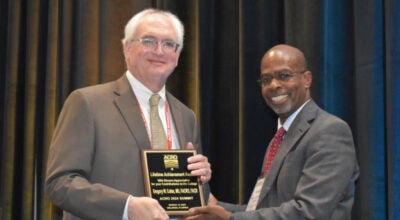Mother says son was killed over small amount of cash
Published 12:01 am Sunday, February 1, 2015

Linda White, the grandmother of Jessie Taylor the 16-year-old that was shot and killed in late December, kisses a framed picture of her grandson while praying during a nonviolence workshop at Natchez High School. Taylor lived with White at the time of his death. She describes him as a good teenager that loved his family and had never been involved in anything dangerous or illegal. (Sam Gause / The Natchez Democrat)
NATCHEZ — Not long before Jessie Taylor Jr. died the 16-year-old took a photo of himself holding a bundle of cash and posted it to the social-media website Instagram.
Most of the wad of cash was just $1 bills, and the photo was the kind a teenager trying to front swagger and toughness would share with the world.
Taylor’s mother, Shauntay Randall, said she believes that photo is why he was killed in late December.
The official police report of the events leading up to his death indicates Taylor was meeting Eddie Minor III, 18, and Emmanuel C. Latham Jr., 15, to purchase synthetic marijuana when the three became involved in a fight that turned into a shooting match after the two assailants tried to rob Taylor.

Linda White, the grandmother of Jessie Taylor, the 16-year-old that was shot and killed in late December, rests her hand on a framed picture of her grandson while praying during a nonviolence workshop at Natchez High School Friday. (Sam Gause / The Natchez Democrat)
But Randall said she believes the official report is incorrect. Her son wasn’t going to buy drugs, she said, but instead had met up with the suspects after they sent him a text message asking him to come to them. Randall said she believes the robbery was always a part of the plan, inspired by the photo posted online.
Regardless of which series of events is correct, the amount of money involved was a hard bargain for a life.
“My baby was killed for $21,” Randall said.
A look at Taylor’s online presence shows other instances of sometimes more ominous posturing, Facebook pictures depicting him flashing a pistol and throwing gang signs.
Tracy Collins, the director of Adams County’s adolescent offender program who counseled Taylor after the teen had gotten in trouble with the law, said those photos show a tough exterior on a kid who was on the inside still trying to figure himself out.
“Jessie had some of that in him, but I would categorize him as being in that life, but not about that life,” Collins said.
“I have had hardened criminals I have worked with, and Jessie wasn’t one of them. He was misguided, confused, and at 16 years old you don’t know your tail from a hole in the ground. This kid was trying to show off more than he is a real, hardened gangster.”
Taylor’s grandmother and primary caregiver, Linda White, said she wasn’t aware of the extent to which he’d fallen in with a bad crowd.
To her, he was a teenager who enjoyed playing sports — especially basketball and football — and had a dog he loved. She said he could be characterized as “an all-around good kid.”
“He was such a sweet kid,” she said.
Taylor was a student at the Natchez Freshman Academy, and his English teacher Chameiko Miller said he’d had some trouble earlier in the year, but had gotten things straightened out. In one instance, they’d exchanged some heated words, but Taylor had later come back to her unprompted and issued a sincere apology.
“He had some rough days, but he was just a child,” Miller said.
The good days far outweighed the bad days, Miller said, and Taylor was more likely than not to have his work completed before the other students.
“He was helpful in the classroom,” Miller said. “When we had student presentations, Jessie was the one who volunteered to hold the poster boards for the other students. He stood there holding those boards for two hours.”
Collins said he couldn’t talk about the circumstances through which he met Taylor because of the youth court system’s rules, but instead said the child he knew liked to ride bikes and defend others as necessary.
“The toughness was just an act,” Collins said. “I saw Jessie display acts of kindness and compassion, and I saw him take up for other kids. He was very humorous, joking around even to his detriment. He was playful and liked having a lot of friends, and he liked people liking him.”
That last variable — liking people liking him — may have what made him want to appear to be streetwise, Collins said.
“I think he just wanted to be a part of something, to be accepted,” he said.
But the gangster brand Taylor wanted to establish online just wasn’t reflected in his daily life, Miller said. Instead, he was a fastidious dresser who took personal grooming seriously.
“He was not just a handsome kid, but he would really take his time and put his clothes on, making sure they were just like they were supposed to be,” she said. “What you see on Facebook is not the real Jessie.”
The last words he said to his teacher were, “Merry Christmas and Happy New Year,” and then, “I love you.”
Bernice Dabon was Taylor’s case manager in the youth court system. He was a happy kid, she said, and always greeted her with a hug.
“He was respectful, and he was actually a joy to work with,” she said. “When this happened, it was a shock, because it wasn’t just someone you read about on the newspaper.”
The night he died, Taylor had been in an exceptionally good mood, White said. They’d gone out to eat, and he’d spent some of the evening at the bowling alley.
“He was just so happy,” she said.
Five minutes after he left the house, people were knocking on White’s door. They told her he’d been shot. He died later that evening.
Collins spoke at Taylor’s funeral. There was no way to gloss over what happened, he said, but the community doesn’t just have to accept that sometimes these things happen to kids.
“If you wanted to place blame, you could track down the usual suspects — schools, family, law enforcement, rap music, whatever — but at the end of the day finding out what was causing delinquency in Jessie is a community matter,” Collins said.
“The solutions to delinquency and violence are not going to be found in law enforcement and in the schools, the solutions are going to be found in the community and the community coming together.
“If you know a kid is on a corner every time you look around, when a community says, ‘We will no longer accept that,’ things will change. When you know a young person has a gun and you do something about it, then things will change.”





